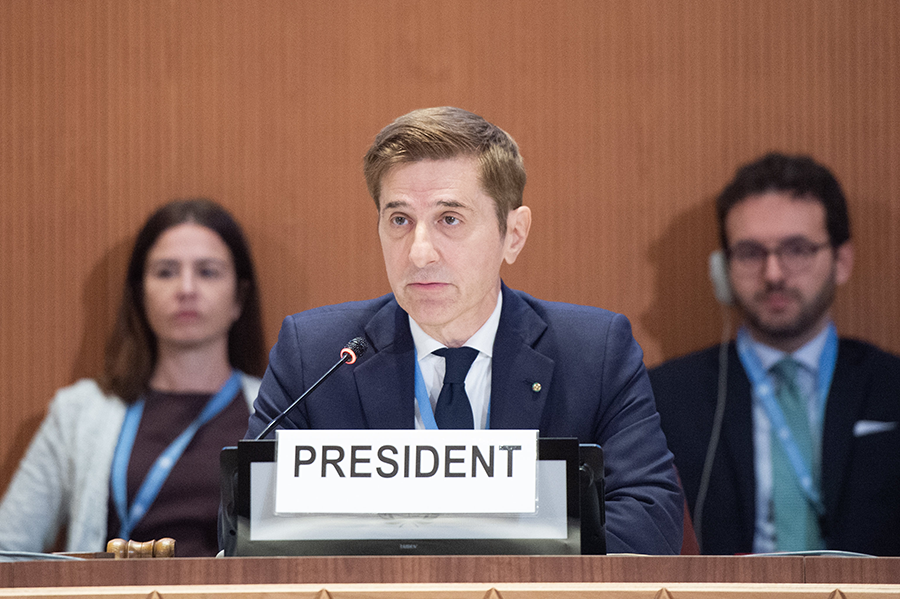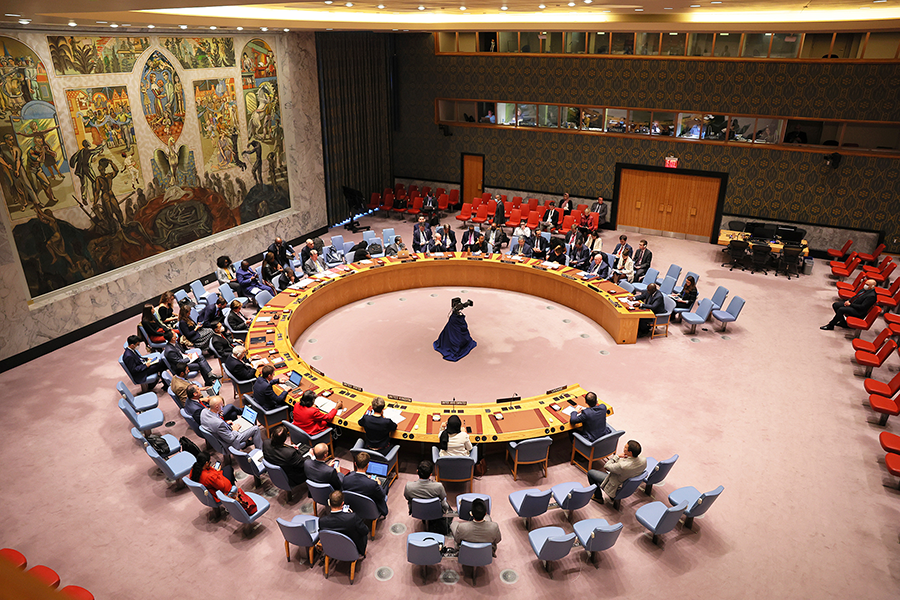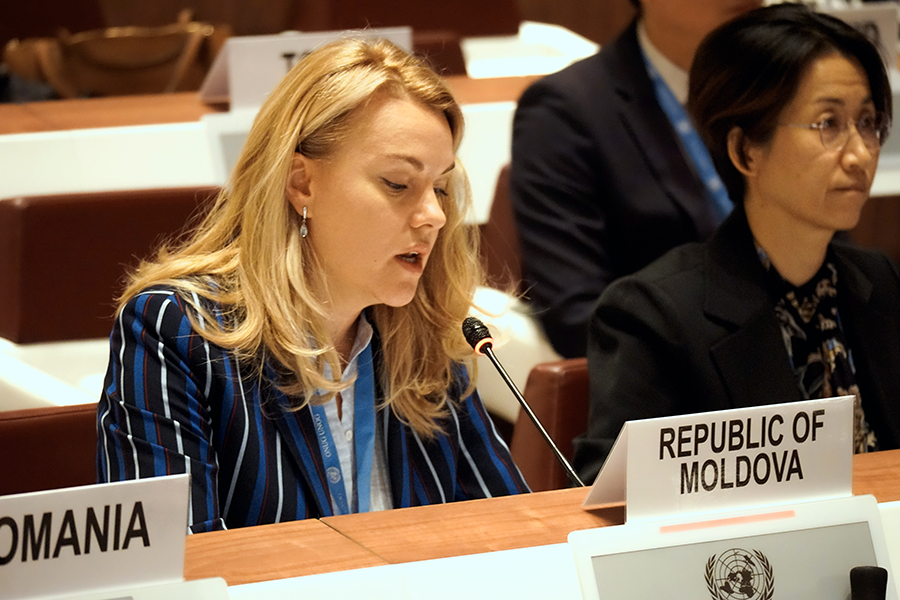“For half a century, ACA has been providing the world … with advocacy, analysis, and awareness on some of the most critical topics of international peace and security, including on how to achieve our common, shared goal of a world free of nuclear weapons.”
Assessing the Ninth BWC Review Conference: An Interview with Conference President Leonardo Bencini
January/February 2023

The ninth review conference of the Biological Weapons Convention (BWC), which took place November 28 to December 16, came at the end of a year in which worsening international relations made it more difficult than usual to achieve multilateral cooperation on even the most pressing security challenges.
The Russian war on Ukraine exacerbated tensions between Moscow and NATO and shook the system of treaties and institutions on which post-Cold War stability has depended. The United States accused Russia of possibly planning to use chemical or biological weapons in Ukraine. Russia accused the United States of funding a network of biological weapons laboratories in Ukraine.
Review Conference President Leonardo Bencini of Italy was determined that the meeting should preserve the credibility of the BWC by producing a final consensus document. One focus of debate was Article X of the BWC, under which states-parties “undertake to facilitate, and have the right to participate in, the fullest possible exchange of equipment, materials and scientific and technological information for the use of bacteriological (biological) agents and toxins for peaceful purposes.”
In February, a report by the UN Institute for Disarmament Research said progress on Article X was a prerequisite for the success of the review conference. Another focus of debate was effective ways for the BWC to be verified. Days after the conference ended, Carol Giacomo, editor of Arms Control Today, spoke with Bencini about what the meeting accomplished and the challenges ahead. The interview has been edited for length and clarity
ARMS CONTROL TODAY: What do you think the review conference achieved?
Leonardo Bencini: The Biological Weapons Convention has been in a deadlock, some people say, for 21 years since negotiations broke down on the issue of verification. For a lot of countries, the issue of verification is a very important one. At this review conference, we established a working group, which is mandated to deal with basically every aspect of strengthening the convention, including verification and other key aspects. So, I think that we’ve succeeded in breaking the deadlock and set out a very good plan of action. We hope that next year we will start the working group and that we can indeed discuss all the key issues concerning the implementation of this convention.
ACT: Why should people care?
Bencini: I’ll tell you why people should care. We have to preserve this convention because it is the only instrument that we have that brings every country together. That’s why we were so keen to get a result. You might say it’s no big deal, but it is a big deal actually because we really had to break this deadlock so that we could still say that we do have a convention on biological weapons, and it is a convention that concerns, now, 184 countries. So basically, there are only 13 countries left to join. My own country believes very much in it, and that’s why we decided to take on this responsibility, because we don’t want fragmentation of the way in which the international community deals with the nonproliferation of weapons of mass destruction. It is absolutely vital that we have a forum where all countries meet and discuss and try to find shared solutions.
Another reason is that we managed to get a deal at the end of a terrible year. You know the international context. In August, we were in New York for the nuclear Nonproliferation Treaty (NPT) review conference. We didn’t approve a final document there. In September, we had a very disappointing end of the Conference of Disarmament in Geneva. The First Committee of the UN General Assembly in New York was very difficult too. So, it’s been very hard. [UN] Secretary-General [António] Guterres’s statement on December 16 said that the result of this BWC review conference gives us a glimmer of hope in an international context that is particularly bleak. So, I think that, yes, it gives us a glimmer of hope.
ACT: The international environment is indeed very tense and difficult, but establishing a working group still seems like a minimal accomplishment.
Bencini: That’s as far as we could go. We also had another section in the final document that we couldn’t approve, the article-by-article review. We couldn’t approve it basically because of the war in Ukraine and because Russia proposed some language that the United States could not accept. We had to drop the entire section, but we saved the decisions and recommendations, which was what mattered.
You’re right to say, basically, you just created this working group. You might say, you couldn’t agree this time on substantive issues, why should you agree next time? We don’t know, but we have to preserve the system, we have to preserve the convention, and we had to give it a new impetus. I’m sure that all the issues that we couldn’t agree on this time will be there in the future. But hopefully, the international environment will get better over the next five years, which is the timeline that we have in front of us, and we’ll be able to achieve agreements on a number of issues. If we didn’t hope so, we wouldn’t do anything. In fact, a lot of people said, “Why are you taking this on?” We said, “Because we believe we can bring something home,” and we did.
Disarmament negotiations are so complex, and the consensus rule makes agreements so difficult to reach. You have to have everyone involved. One country is enough to wreck the whole thing. Even I was quite surprised at the positive reaction that we had after the conference when everyone was congratulating us and themselves. It was really good because you could see that, in fact, people care. They knew that we got something, even something small, but something meaningful, something that gives us work to do, something that gives us a timeline, something that gives us homework. Now we’ve got something to work on for the next five years.
ACT: Do you think that a working group and what came out of this conference is enough to mitigate the threat that Russia has become to the BWC regime?
Bencini: We live in the same world, but I think it was encouraging to see that we’re much together in agreement, of which Russia is also a party. The Russian Federation joined the consensus. We negotiated also with them, and I think this is very important. Although what we agreed on basically was what we’re going to discuss for the next five years, I think it was important to have every country involved. We hope that this sends a good signal. This is what Secretary-General Guterres said also, but we don’t know yet. Let’s hope at least.
 ACT: My understanding is that agreement on things like the proposed cooperation advisory group and the scientific advisory board looked very promising, even near the end of the conference, and yet they were not agreed to. What happened to those ideas, which arguably seem in everybody’s interest?
ACT: My understanding is that agreement on things like the proposed cooperation advisory group and the scientific advisory board looked very promising, even near the end of the conference, and yet they were not agreed to. What happened to those ideas, which arguably seem in everybody’s interest?
Bencini: There were countries that couldn’t join the consensus. I won’t mention them by name, but that’s what happened. Remember one thing: Now, we have outlined a mechanism, both for Article X and science and technology; in fact, the science and technology part is quite developed. We had a very detailed proposal, and the facilitator, who’s been working on that, won’t give up. So, we have a plan laid out there, and I’m sure that this will form the basis of future negotiations. It was important to keep any final decisions and recommendations with reference to mechanisms, both for Article X, which many states-parties care very much about, and the scientific and technology dimension, which in principle every country cares about.
ACT: What was achieved that shows the public that the BWC is responding to the COVID-19 pandemic, other pandemic threats, and biological risks generally?
Bencini: That the process is not dead. It continues and needs to be developed, of course, but we’ve learned a lesson from the pandemic, and we had to respond somehow. Bear in mind, if the international context had been different, if the international context had been that of a year ago, we would have achieved much more. So, we have to always remember the general context.
As I said, [the BWC] is an instrument that is very important. People don’t quite realize how important it is because it’s easier to think of the nuclear threat. It’s more difficult to understand biological weapons because they can be any kind of weapon. But now after the pandemic, people are beginning to understand this as well. When we think of biological weapons, we should not just think of human beings being targeted. You can target a crop, and there are countries whose economies rely almost entirely on one crop. If you want to damage them, that’s enough. So, you don’t even have to infect human beings with a pathogen, you can just infect a plant. There are many ways.
I won’t go into details because I’m not an expert, but definitely biotechnology has advanced very fast in the past few years, and we need to keep up. It’s not easy, but there is a message that I want to give, that this convention is indeed important. Let’s not consider it less important than the NPT. I would say the threat could even be worse, because while it’s easier to monitor and verify a country that wants to develop a nuclear weapons program, it’s much more difficult to verify biological weapons. There are hundreds of thousands of establishments and facilities in the world that could be weaponized.
That is why we also need to address this issue from the national implementation point of view. We have to have scientists on board. We have to make sure that we have an international network of expert people to communicate with one another, but we don’t have enough resources in this BWC. If I told you that, yes, everyone wants to really strengthen this convention, that would be a lie. If this time we managed to keep this process going, that was an achievement in itself.
ACT: You said one important challenge is verifying BWC compliance. What can be done to strengthen the capability for holding BWC violators accountable?
Bencini: That needs to be further examined, studied, looked into with the help of scientists who tell us where the technology is now and what we need to do because you can’t imagine a standard verification regime for biological weapons. You need to be more creative, more innovative, and listen to the scientists. It’s a completely different approach. The approach that was followed 20 years ago will not work now, which is the reason why, when countries said, “We have to restart negotiations for a legally binding protocol from where we left off,” that wouldn’t work. This is why we need to discuss with fresh eyes, with a new approach, the issue of verification and compliance—how to verify, how to make sure that you get compliance from states-parties. Let’s remember one thing: Most of the time, the only difference between a peaceful program and a program to develop biological weapons is intent. It’s not the process. The process is the same, but it’s very difficult indeed to demonstrate this.
 ACT: Can you talk about the gender gap and the need to promote a more inclusive BWC decision-making process? I understand that some proposals to include equal representation of women in BWC-related activities were excluded from the final document. What is the plan for doing better?
ACT: Can you talk about the gender gap and the need to promote a more inclusive BWC decision-making process? I understand that some proposals to include equal representation of women in BWC-related activities were excluded from the final document. What is the plan for doing better?
Bencini: There is a reference in the final document about the need to include more women. There were other references, actually, and also in the part that was dropped, because the countries that believe in this made it a priority. I made it a priority of my presidency. I said from the beginning I want to give this review conference gender balance, I want to make this a priority, and I did. I’m very pleased that we achieved the chairs of the two main committees—the committee of the whole and the drafting committee—were women. I had a team of facilitators, and the majority of them were women. When the conference bureau met, the majority of the people around the table were women. So, I was very pleased with that because we had very competent women in the team that made a difference.
Of course, we need to do much more. You have to raise the issue over and over again and keep at it. There are countries that don’t support it as much as we like. Unfortunately, they are more or less the same countries that oppose the other possible developments in the convention, but it doesn’t matter. We have to keep making it a priority because the vast majority of states-parties consider it a priority. A lot of Latin American and Asian countries have taken up initiatives on this issue. I think it’s very much on the agenda.
ACT: The right to exchange equipment, materials, and information for peaceful purposes under the BWC is under attack. How can states-parties ensure that Article X continues to be upheld?
Bencini: We had an intensive discussion with respect to Article X, and we managed to get a good agreement that couldn’t enjoy consensus unfortunately. But again, the vast majority of Non-Aligned Movement countries worked very much in a very cooperative manner with, for instance, Western countries. I think if the international context had been different, we would have had a good deal on that.
Remember one thing, that this should not be a development forum. We should discuss basically how to exchange information and do matchmaking. The peaceful use of science and technology is a very important principle in every disarmament and nonproliferation convention, not just in this one, but it has to be done in a way that is agreeable to everyone. It shouldn’t be just a developing world issue; it is an issue that concerns every country.
I do understand that many countries would like more technology transfer, and we have seen this during the COVID-19 pandemic. Some countries didn’t feel that enough was done to transfer technology in that respect, and I do believe that we should do more, absolutely. But there are a lot of organizations that are involved in development. The BWC remains a disarmament and nonproliferation treaty. It is not a development treaty. So, let’s not make a development forum out of Article X. It should be a matchmaking arena, if you wish. We have to work toward that direction.
ACT: Is there anything else that you would like to add?
Bencini: If it had not been for the international context, we would have had a historic agreement. It would have gone so far, and so, it is regrettable. Even in this context, the review conference produced one of the very few agreements that was reached in the international scene anywhere on any issues this year. That by itself is a very important achievement. Everyone that was involved in this should be very proud of it. This is what gives us hope and motivation to carry on. Next year, we’ll have the first meetings of this working group, and we’ll take it from there.
